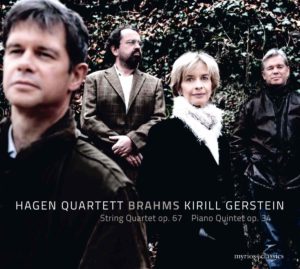The scrupulous ensemble polish and textural transparency characterizing many of the Hagen Quartet’s performances sometimes spill over into preciosity and archness, as in this recording of what is possibly the most exuberant and inventive of Brahms’ three string quartets. They tend, for example, to underplay the first-movement Vivace’s dynamic contrasts and boisterous cross-rhythms. While the group imbues the gorgeous slow movement with the highest levels of refinement and delicacy, I miss the firmer rhythmic underpinning and more generous tonal variety distinguishing the Tokyo Quartet’s Vox recording and the Quartetto Italiano’s more expansive Philips version. The Scherzo’s gnarly lines and syncopations are clearly outlined and contoured, yet without the Emerson Quartet’s truly Agitato animation and shapelier pizzicatos. As for the preciosity I mentioned before, compare the Hagen’s fussy tapering in the Finale’s main theme next to the Alban Berg Quartet’s fluid continuity and directness.
With longtime collaborator Kirill Gerstein in tow, the Hagens achieve levels of ensemble integration that reveal obvious thought, care, and calibration throughout Brahms’ Piano Quintet. Notice, for example, how sensitively and perceptively Gerstein ascertains when to assert himself in the forefront and when to pull back either to accompany or to simply blend with his colleagues, such as in the first movement’s second subject, or in the eerily sustained quiet passages prior to the recapitulation. Indeed, the feeling of detailed deliberation throughout the movement contrasts to the controlled ferocity of my reference Stephen Hough/Takács Quartet and Rudolf Serkin/Budapest Quartet editions.
The latter’s warm and passionately sung-out slow movement also differs from Gerstein/Hagen’s cooler, lighter surface style that nevertheless keeps the music’s harmonic tension alive and allows more prominence than usual to the inner lines. That the musicians approach the Scherzo’s dotted rhythms with the utmost in exactitude and tonal blend and with nary a scrape nor an unwanted accent is beyond question, yet at the expense of nervous energy.
Although I personally prefer more virtuosic drive and momentum in the Finale, one must acknowledge that the players take Brahms’ “non troppo” directives on good faith. The opening sostentuto section (together with its reappearance toward the end of the movement) acquires darker, more desolate hues on account of the group’s discreet vibrato and long-lined concentration. All told, Gerstein and the Hagen Quartet erase all gaps between intention and execution in performances that, for all their strong assets, command well-earned respect rather than unconditional enjoyment.
































